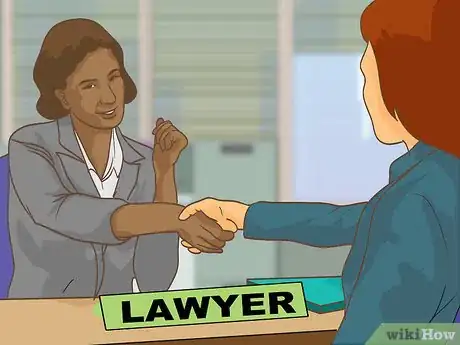X
This article was co-authored by Clinton M. Sandvick, JD, PhD. Clinton M. Sandvick worked as a civil litigator in California for over 7 years. He received his JD from the University of Wisconsin-Madison in 1998 and his PhD in American History from the University of Oregon in 2013.
There are 7 references cited in this article, which can be found at the bottom of the page.
This article has been viewed 25,788 times.
While both nonprofits and cooperatives are fairly common it's pretty rare to see a nonprofit co-op. There are some important regulations you need to know to maintain this status, but fortunately, we're here to help!
Steps
Part 1
Part 1 of 3:
Planning the Cooperative
-
1Find potential cooperative members. You need to form an organizing committee. This committee will perform the initial exploratory meetings and perform analyses to decide if a coop is feasible.[1] Ideally, you will want to form an organizing committee with like-minded individuals who are passionate about the issue driving the need for the coop.
- Reach out to friends or family members who might be interested in forming a coop.
- You could also contact charities. Sometimes, charities decide to form non-profits in order to advance their goals in the community. Charity members might be interested in helping to form the non-profit cooperative.
-
2Meet to discuss your goals and strategy. Members of a coop are intimately involved with all day-to-day operations of the organization. Accordingly, all members will need to be on the same page when it comes to the coop’s goals and strategy. Once you have identified a core group of people interested in forming the organizing committee, you should schedule several meetings where you can discuss the following:
- What are your goals and strategy? To form a credit union that can bring economic opportunity to a depressed economic area? To sell locally produced goods? To create independent media?[2]
- Will the business grow out of an existing one, or will it be built up from the ground?
- Does the organizing committee have all of the expertise necessary to run the coop? What other expertise is necessary?
- How will decisions be made? You should consider whether decisions will be made unanimously, by majority, or by supermajority (more than 50% but less than 100%).
- How will you hire new people? Since the cooperative structure is so different from traditional work environments, you might want to give people a trial period to see if they like it. If the employee is a poor fit, then you can end the work relationship.
Advertisement -
3Identify sources of funding. Before starting the process of creating your nonprofit cooperative, you need to figure out how to pay for the initial start-up costs. You should create a budget and then identify realistic sources of funding. You have different options:[3]
- You can get the money from members. Each founding member contributes money.
- You could get a loan. Identify a bank (or a credit union) that has given loans to cooperatives before.
- A grant from a cooperative incubator.
-
4Find a cooperative incubator to help you. Also called “cooperative developers,” these organizations help new incubators get off the ground. They often provide advice, training, and other resources to help cooperatives establish themselves. Some incubators help businesses transition from one form to the cooperative form, whereas other incubators will help new cooperatives start from scratch.
- To find an incubator, search the Internet. Type “cooperative incubator” and your state into your favorite search engine.
- You have to apply for the incubator program and meet any program requirements that it has established. You may also need to pay an initial fee as well as monthly fees to continue to receive help.
Advertisement
Part 2
Part 2 of 3:
Getting Legal Help
-
1Meet with a business lawyer. Cooperatives that are run for the mutual benefit of its members can sometimes qualify as non-profits. These are fairly rare, though. Accordingly, you should bring a business lawyer into your planning very early on in the process. If your state doesn’t let you form non-profit cooperatives, then you should find that out before beginning your planning for the coop.
- To find an experienced business attorney, you should contact your local or state bar association and ask for a referral. Alternately, you could ask another cooperative if they would recommend their lawyer. Once you have the name of the lawyer, schedule a consultation.
- You will have to pay for legal advice. Even if the lawyer agrees to a free initial consultation, he or she is unlikely to give out legal advice for free. Typically, the consultation is simply a “meet and greet” affair. However, if you are looking for legal advice, then say so when you call to schedule the consultation. The lawyer can quote you a price for a half hour or hour of legal advice.
-
2Ask whether you can create a non-profit cooperative. Not every state allows you to create this kind of business. Before meeting with the lawyer, sketch out what your plans are for the non-profit and ask the lawyer whether you think this type of cooperative would qualify for non-profit status.
- The most common non-profit cooperatives are credit unions and housing coops.
- Nonprofit cooperatives were also created as a response to the national healthcare legislation passed in 2010.[4]
-
3Get the required paperwork. If the lawyer thinks you can legally form a non-profit cooperative in your state, then he or she should help you find necessary forms to fill out. For example, you will need to complete Articles of Incorporation and file them with your state’s Department of Corporations or Secretary of State’s Office.[5] Your lawyer should be able to get the forms for you.
- In order to operate as a non-profit, you also need to fill out applications for federal and state tax exemptions.[6] This is how you apply for non-profit status. If you are denied non-profit status, then your coop will be for profit.
-
4Return to the lawyer with questions. You should develop a good relationship with your lawyer, because you may have to return several times in the future for advice. For example, you should have the lawyer look over your bylaws as well as other organizational materials.
- In the future, you may need a lawyer’s advice to help you with hiring or firing employees, defending yourself in a lawsuit, or dealing with the IRS.
Advertisement
Part 3
Part 3 of 3:
Forming the Cooperative
-
1Create bylaws. Your state law may require that you create bylaws.[7] Bylaws essentially serve as the operating manual for how the cooperative will be run. Even if your state doesn’t require bylaws, it is a good idea to create them. Make sure to include the following when you draft your bylaws:[8]
- membership requirements
- member duties
- the responsibilities of coop members
-
2Create a membership application. You need to give people a way to join your non-profit cooperative. You should create a template which you can copy and distribute to multiple people to fill out. Make sure your membership application contains the following:[9]
- the applicant’s name
- a summary of member rights and benefits
- signature from the board of directors
-
3Elect directors at a charter meeting. The initial group of members are called “chartered members.” You will need to discuss and possibly revise any bylaws at the initial meeting. You also need to identify the board of directors if they were not named in your articles of incorporation.[10]
- Remember that you must follow your state’s laws on record keeping, which includes taking minutes of your meetings. You should talk with your lawyer about precise requirements in your state.
-
4Get licenses and permits. You can’t run any business, not even a non-profit, unless you have the required licenses and permits applicable to your business. You should contact your state to find out what licenses and permits you will need.
- To find what you need, you can visit the Small Business Administration’s website, which provides links to the office in each state that issues permits.[11]
- Be sure to get all necessary permits and licenses before beginning your business. It is illegal to run a business without your state’s approval.
Advertisement
References
- ↑ https://www.sba.gov/starting-business/choose-your-business-structure/cooperative
- ↑ http://www.shareable.net/blog/how-to-start-a-worker-co-op
- ↑ http://www.shareable.net/blog/how-to-start-a-worker-co-op
- ↑ https://www.healthinsurance.org/glossary/non-profit-cooperatives/
- ↑ https://www.sba.gov/starting-business/choose-your-business-structure/cooperative
- ↑ http://www.nolo.com/legal-encyclopedia/nonprofit-basics-29948.html
- ↑ http://www.leg.state.nv.us/nrs/nrs-081.html#NRS081Sec010
- ↑ https://www.sba.gov/starting-business/choose-your-business-structure/cooperative
- ↑ https://www.sba.gov/starting-business/choose-your-business-structure/cooperative
About This Article
Advertisement













(3)-Status-of-a-Nonprofit-Step-13-Version-2.webp)







(3)-Nonprofit-Organization-Step-19-Version-2.webp)












(3)-Status-of-a-Nonprofit-Step-13-Version-2.webp)




































